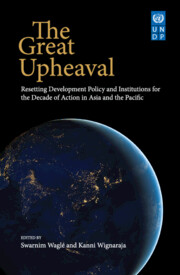Book contents
- Frontmatter
- Contents
- List of Figures
- List of Tables
- List of Boxes
- List of Appendices
- List of Abbreviations
- Foreword
- Acknowledgements
- Introduction
- 1 Aligning Sovereign Debt Financing with Climate Action in the Asia-Pacific Region
- 2 Melting Glaciers, Threatened Livelihoods: Confronting Climate Change to Save the Third Pole
- 3 Accelerating Universal Digital Connectivity
- 4 The Post-COVID-19 Future for Global Value Chains
- 5 Is Southeast Asia Falling into a Latin American–Style Middle-Income Trap?
- 6 Equality of Opportunity as a Measure of Development
- 7 Insights for Policymaking from the Multidimensional Poverty Index
- 8 COVID-19 and Human Security
- 9 Making COVID-19 Vaccine Universally Accessible
- 10 Enhancing the Provision of Global Public Goods: Ready for More Realism?
- 11 Asian-Pacific Regional Cooperation in the Post-COVID-19 Era
- 12 Pandemic Governance and Human Development: Early Lessons from Asia
- 13 Seven Lessons for Development Policy from the COVID-19 Pandemic
- About the Contributors
- Index
12 - Pandemic Governance and Human Development: Early Lessons from Asia
Published online by Cambridge University Press: 28 February 2022
- Frontmatter
- Contents
- List of Figures
- List of Tables
- List of Boxes
- List of Appendices
- List of Abbreviations
- Foreword
- Acknowledgements
- Introduction
- 1 Aligning Sovereign Debt Financing with Climate Action in the Asia-Pacific Region
- 2 Melting Glaciers, Threatened Livelihoods: Confronting Climate Change to Save the Third Pole
- 3 Accelerating Universal Digital Connectivity
- 4 The Post-COVID-19 Future for Global Value Chains
- 5 Is Southeast Asia Falling into a Latin American–Style Middle-Income Trap?
- 6 Equality of Opportunity as a Measure of Development
- 7 Insights for Policymaking from the Multidimensional Poverty Index
- 8 COVID-19 and Human Security
- 9 Making COVID-19 Vaccine Universally Accessible
- 10 Enhancing the Provision of Global Public Goods: Ready for More Realism?
- 11 Asian-Pacific Regional Cooperation in the Post-COVID-19 Era
- 12 Pandemic Governance and Human Development: Early Lessons from Asia
- 13 Seven Lessons for Development Policy from the COVID-19 Pandemic
- About the Contributors
- Index
Summary
INTRODUCTION
As the pandemic continues course into the second year, it is now widely recognized that it has worsened inequalities and exposed the longstanding fragilities and fractures in national and global governance (The Independent Panel, 2021; IMF, 2020; Oxfam, 2020b). The inequities in access to healthcare, the toll of job losses falling on low-wage workers, the burden of unpaid care work falling on women and escalating gender violence have magnified already existing vulnerabilities and powerlessness among marginalized groups. Vaccine nationalism and the weakness of multilateral cooperation in arranging universal access to COVID-19 vaccinations expose the economic and political fault lines of the 21st Century global order.
As Patel and Sridhar (2020) comment in the Lancet Regional Health, “the relative global success to control the COVID-19 pandemic, keep their economies afloat and avoid longer, harsh lockdown measures are markedly skewed towards the Asia-Pacific region”. This success has depended largely on the effective implementation of non-pharmaceutical interventions (NPIs), combined with strong institutional capacity: primary health systems, effective leadership and active public engagement. This chapter further highlights how these successes reflect the importance of institutional capacity. The aim of this chapter is to review the consequences of the pandemic and the national responses to the public health and socioeconomic crises in order to learn lessons for governing pandemics, now and in the future. The analysis uses the framework of human development and capability approach and considers the objectives of pandemic governance to extend beyond stopping the spread of the virus and addresses broader socioeconomic and human consequences (Sen, 1999).
Our analysis finds that, while many countries of the regions have had relative success in containing the epidemic outbreak so far, their strategies raise questions about equity, participation and human rights issues. Moreover, many of the low- and middle-income countries in the region have felt some of the strongest effects from the global recession. These complex challenges expose some key gaps in national and global institutions that require priority policy attention. The chapter highlights three of them: the underfunding of public health infrastructure; global norms for the provision of global public goods, notably vaccines; and the protection of low-wage workers in the global economy.
- Type
- Chapter
- Information
- The Great UpheavalResetting Development Policy and Institutions in the Asia-Pacific, pp. 324 - 359Publisher: Cambridge University PressPrint publication year: 2022



